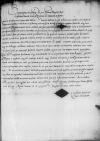Nemini dubium id esse arbitramur, haberi a Cruciferis in Germany (Germania, Niemcy)⌊GermaniaGermany (Germania, Niemcy)⌋ delectum militum consiliumque eos cepisse in terras Prussia, region in central Europe, bordered by Pomerania, Poland, Lithuania and Livonia. From 1466 Prussia was divided into Royal Prussia (Prussia Regalis), which was a part of the Kingdom of Poland, and Teutonic Prussia (Prussia Ordinis Theutonici) – covering the remnants of the former territory of the Teutonic Order’s state in Prussia. In 1525, the Order’s last Grand Master, Albrecht von Hohenzollern, converted to Lutheranism and became the first lay duke in former Teutonic Prussia (dux in Prussia), which from then on was called Ducal Prussia (Prussia Ducalis). At that time, as a result of the treaty of Cracow, Ducal Prussia became a fief of the kings of Poland⌊PrussiaePrussia, region in central Europe, bordered by Pomerania, Poland, Lithuania and Livonia. From 1466 Prussia was divided into Royal Prussia (Prussia Regalis), which was a part of the Kingdom of Poland, and Teutonic Prussia (Prussia Ordinis Theutonici) – covering the remnants of the former territory of the Teutonic Order’s state in Prussia. In 1525, the Order’s last Grand Master, Albrecht von Hohenzollern, converted to Lutheranism and became the first lay duke in former Teutonic Prussia (dux in Prussia), which from then on was called Ducal Prussia (Prussia Ducalis). At that time, as a result of the treaty of Cracow, Ducal Prussia became a fief of the kings of Poland⌋ impetum faciendi atque tam nostrae, quam illustris domini Albrecht I von Hohenzollern-Ansbach (Albrecht von Brandenburg) (*1490 – †1568), 1511-1525 Grand Master of the Teutonic Order; from 1525 to his death Duke in Prussia as a liegeman of the Polish king; son of Friedrich V of Brandenburg der Ältere and Sophia Jagiellon (daughter of Casimir IV Jagiellon), nephew of Sigismund I, King of Poland; founder of the university in Königsberg (1544)⌊ducis AlbertiAlbrecht I von Hohenzollern-Ansbach (Albrecht von Brandenburg) (*1490 – †1568), 1511-1525 Grand Master of the Teutonic Order; from 1525 to his death Duke in Prussia as a liegeman of the Polish king; son of Friedrich V of Brandenburg der Ältere and Sophia Jagiellon (daughter of Casimir IV Jagiellon), nephew of Sigismund I, King of Poland; founder of the university in Königsberg (1544)⌋ potestati subiectis periculum cr stain⌈[iculum cr]iculum cr stain⌉eandi, tum et vicinas terris istis regiones bellorum ardere incendiis, ut periculum sit, ne propter vicinum malum aliquid eis quoque mali eveniat.
Nos, qui semper animo excubamus, ut ne quid necopinantes subditi nostri detrimenti accipiant, quo facilius hostium consilia praeripi et eorum conatibus obviam veniri possit, Provincial Diet of Royal Prussia ⌊comitia terrarum nostrarum PrussiaeProvincial Diet of Royal Prussia ⌋ ad proximum 1535-10-18⌊diem divo Lucae1535-10-18⌋ sacrum indicenda putavimus atque ea Elbing (Elbląg), city in northern Poland, Pomerania, on the Vistula Lagoon, one of the three Great Prussian Cities (beside Gdańsk (Danzig) and Thorn (Toruń)) which had representatives in the Prussian Council; member of the Hanseatic League⌊ElbingiElbing (Elbląg), city in northern Poland, Pomerania, on the Vistula Lagoon, one of the three Great Prussian Cities (beside Gdańsk (Danzig) and Thorn (Toruń)) which had representatives in the Prussian Council; member of the Hanseatic League⌋ celebrari volumus, ubi cum de more omnes convenerint, rationem iniri volumus, qua si quis ex improviso hostium impetus exsistat, possit non ita magno negotio propulsari.
Quare Paternitatem Vestram hortamur eique mandamus, ut ad proximum 1535-10-18⌊diem divo Lucae1535-10-18⌋ sacrum Elbing (Elbląg), city in northern Poland, Pomerania, on the Vistula Lagoon, one of the three Great Prussian Cities (beside Gdańsk (Danzig) and Thorn (Toruń)) which had representatives in the Prussian Council; member of the Hanseatic League⌊ElbingumElbing (Elbląg), city in northern Poland, Pomerania, on the Vistula Lagoon, one of the three Great Prussian Cities (beside Gdańsk (Danzig) and Thorn (Toruń)) which had representatives in the Prussian Council; member of the Hanseatic League⌋ se conferat atque ibi Provincial Diet of Royal Prussia ⌊comitiisProvincial Diet of Royal Prussia ⌋ intersit neque committat ullo pacto, si modo gratiam nostram regiam vult retinere, ut inde se subducat, quin cum aliis Council of Royal Prussia the most important local authority in Royal Prussia. It consisted of two bishops (of Ermland (Warmia), who served as the Council’s president, and of Kulm (Chełmno)), three voivodes (of Kulm, Marienburg (Malbork), and Pomerania), three castellans (of Kulm, Elbing (Elbląg), and Gdańsk (Danzig)), three chamberlains (of Kulm, Marienburg, and Pomerania), and representatives of the three Great Prussian Cities – Gdańsk, Thorn (Toruń), and Elbing (ACHREMCZYK 2016, p. 17-18)⌊terrarum Prussiae consiliariisCouncil of Royal Prussia the most important local authority in Royal Prussia. It consisted of two bishops (of Ermland (Warmia), who served as the Council’s president, and of Kulm (Chełmno)), three voivodes (of Kulm, Marienburg (Malbork), and Pomerania), three castellans (of Kulm, Elbing (Elbląg), and Gdańsk (Danzig)), three chamberlains (of Kulm, Marienburg, and Pomerania), and representatives of the three Great Prussian Cities – Gdańsk, Thorn (Toruń), and Elbing (ACHREMCZYK 2016, p. 17-18)⌋ audito nuntio nostro, quem istuc missuri sumus, de iis, quae sunt Poland (Kingdom of Poland, Polonia)⌊reipublicaePoland (Kingdom of Poland, Polonia)⌋ rationibus conductura, consilium ineat. De eo autem in primis deliberet, quemadmodum parati esse possitis ad omnes hostiles impetus non solum excipiendos, verum etiam arcendos, ut multo ante meditata consilia habeatis, quibus impendentibus malis occurrere possitis. Solent enim praevisa tela minus nocere.
Bene valeat Paternitas Vestra, pro officio suo aliter non factura.


 BCz, 1601, p. 298
BCz, 1601, p. 298